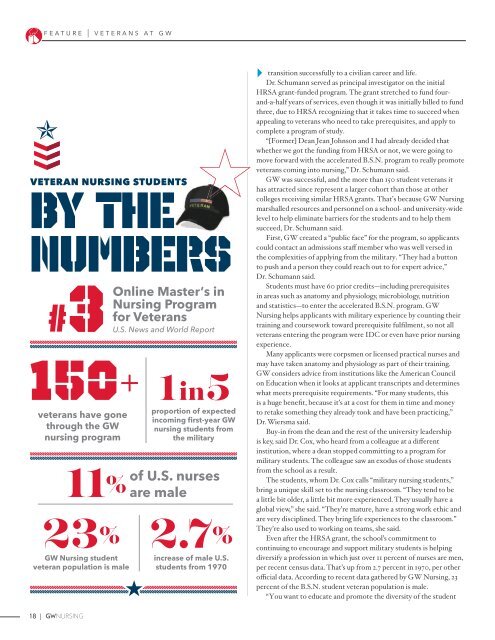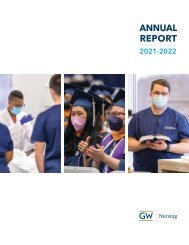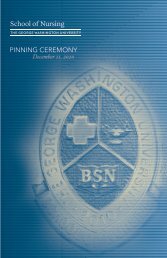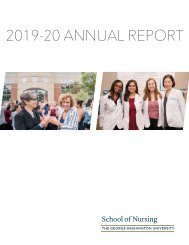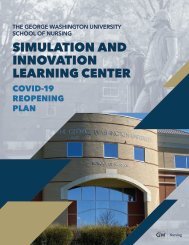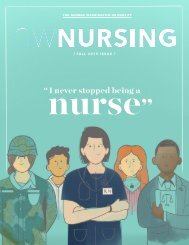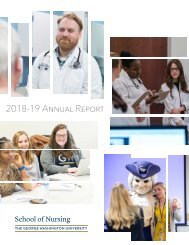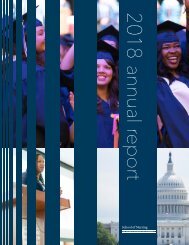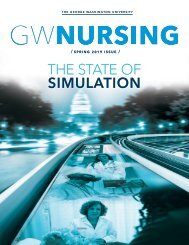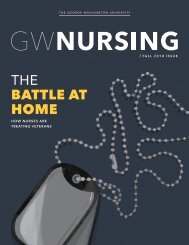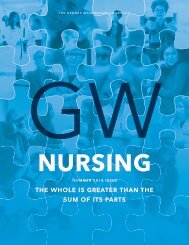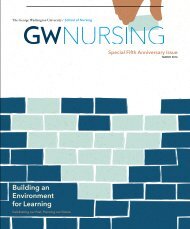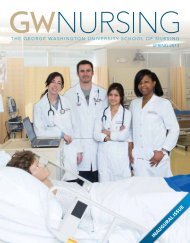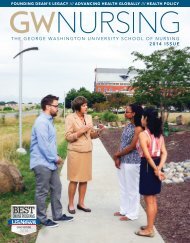GW Nursing Magazine Spring 2020
GW Nursing is a publication of the George Washington University School of Nursing. The magazine tells the story of GW nurses and their endeavors in the areas of education, research, policy and practice.
GW Nursing is a publication of the George Washington University School of Nursing. The magazine tells the story of GW nurses and their endeavors in the areas of education, research, policy and practice.
You also want an ePaper? Increase the reach of your titles
YUMPU automatically turns print PDFs into web optimized ePapers that Google loves.
feature | veterans at gw<br />
VETERAN NURSING STUDENTS<br />
BY THE<br />
NUMBERS<br />
Master‘s in<br />
<strong>Nursing</strong> Program<br />
for Veterans<br />
#3Online<br />
U.S. News and World Report<br />
150+ 1in5<br />
veterans have gone<br />
through the <strong>GW</strong><br />
nursing program<br />
11%<br />
23%<br />
<strong>GW</strong> <strong>Nursing</strong> student<br />
veteran population is male<br />
proportion of expected<br />
incoming first-year <strong>GW</strong><br />
nursing students from<br />
the military<br />
of U.S. nurses<br />
are male<br />
2.7%<br />
increase of male U.S.<br />
students from 1970<br />
transition successfully to a civilian career and life.<br />
Dr. Schumann served as principal investigator on the initial<br />
HRSA grant-funded program. The grant stretched to fund fourand-a-half<br />
years of services, even though it was initially billed to fund<br />
three, due to HRSA recognizing that it takes time to succeed when<br />
appealing to veterans who need to take prerequisites, and apply to<br />
complete a program of study.<br />
“[Former] Dean Jean Johnson and I had already decided that<br />
whether we got the funding from HRSA or not, we were going to<br />
move forward with the accelerated B.S.N. program to really promote<br />
veterans coming into nursing,” Dr. Schumann said.<br />
<strong>GW</strong> was successful, and the more than 150 student veterans it<br />
has attracted since represent a larger cohort than those at other<br />
colleges receiving similar HRSA grants. That’s because <strong>GW</strong> <strong>Nursing</strong><br />
marshalled resources and personnel on a school- and university-wide<br />
level to help eliminate barriers for the students and to help them<br />
succeed, Dr. Schumann said.<br />
First, <strong>GW</strong> created a “public face” for the program, so applicants<br />
could contact an admissions staff member who was well versed in<br />
the complexities of applying from the military. “They had a button<br />
to push and a person they could reach out to for expert advice,”<br />
Dr. Schumann said.<br />
Students must have 60 prior credits—including prerequisites<br />
in areas such as anatomy and physiology, microbiology, nutrition<br />
and statistics—to enter the accelerated B.S.N. program. <strong>GW</strong><br />
<strong>Nursing</strong> helps applicants with military experience by counting their<br />
training and coursework toward prerequisite fulfilment, so not all<br />
veterans entering the program were IDC or even have prior nursing<br />
experience.<br />
Many applicants were corpsmen or licensed practical nurses and<br />
may have taken anatomy and physiology as part of their training.<br />
<strong>GW</strong> considers advice from institutions like the American Council<br />
on Education when it looks at applicant transcripts and determines<br />
what meets prerequisite requirements. “For many students, this<br />
is a huge benefit, because it’s at a cost for them in time and money<br />
to retake something they already took and have been practicing,”<br />
Dr. Wiersma said.<br />
Buy-in from the dean and the rest of the university leadership<br />
is key, said Dr. Cox, who heard from a colleague at a different<br />
institution, where a dean stopped committing to a program for<br />
military students. The colleague saw an exodus of those students<br />
from the school as a result.<br />
The students, whom Dr. Cox calls “military nursing students,”<br />
bring a unique skill set to the nursing classroom. “They tend to be<br />
a little bit older, a little bit more experienced. They usually have a<br />
global view,” she said. “They’re mature, have a strong work ethic and<br />
are very disciplined. They bring life experiences to the classroom.”<br />
They’re also used to working on teams, she said.<br />
Even after the HRSA grant, the school’s commitment to<br />
continuing to encourage and support military students is helping<br />
diversify a profession in which just over 11 percent of nurses are men,<br />
per recent census data. That’s up from 2.7 percent in 1970, per other<br />
official data. According to recent data gathered by <strong>GW</strong> <strong>Nursing</strong>, 23<br />
percent of the B.S.N. student veteran population is male.<br />
“You want to educate and promote the diversity of the student<br />
18 |


